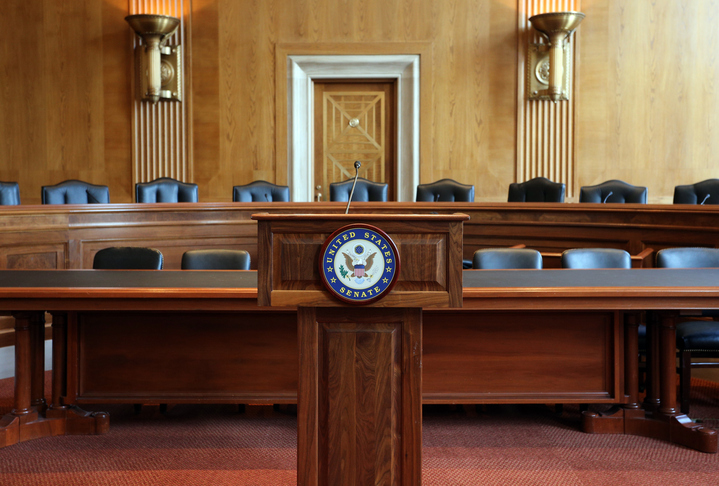July 13, 2018
Questions for Judge Kavanaugh on his Disqualification from Certain Cases Involving the Powers and Immunities of the President
inbrief

In due course, Judge Brett Kavanaugh will appear before the Senate Judiciary Committee for questioning by Senators on his nomination by President Trump to the Supreme Court. If confirmed as a Justice, among the important questions he might face will be these, which concern the President’s possible personal exposure to criminal prosecution or civil liability for his conduct before or during his presidency:
- While in office, may the President be sued civilly and have to produce documents and other information in discovery, sit for depositions, and appear at trial?
- While in office, may the President be investigated for criminal acts, indicted, and prosecuted?
If these issues surface at the Court, it is arguable that Kavanaugh would have to disqualify himself in any cases where either or both of these two questions arise. So, it is vital that Senators explore, in the confirmation process, Judge Kavanaugh’s approach to them.
Below is an initial draft of questions that could be put to Judge Kavanaugh on these questions when he testifies before the Judiciary Committee or in writing.
Do you agree that, as a sitting Justice, you have a statutory duty, pursuant to 28 U.S.C. 455(a), to disqualify yourself in a case before the Court where your impartiality might reasonably be questioned?
If you agree about your statutory duty, do you promise this Committee and the Senate that you will disqualify yourself in all cases before the Court where your impartiality might reasonably be questioned?
Do you agree that a judge’s impartiality might reasonably be questioned if a judge has made a public statement, other than in a court proceeding, judicial decision, or opinion, that commits or appears to commit the judge to reach a particular result or rule in a particular way in the proceeding or controversy?
And, do you agree that a judge who has made such a public statement outside a proceeding, decision, or opinion, has displayed a personal or intellectual bias on an issue that might predispose the judge to a particular result in any case involving that issue?
Judge Kavanaugh, in 2009, you authored a law-review article entitled, “Separation of Powers During the Forty-Fourth Presidency and Beyond,” correct?
You were the sole author of that article, correct?
At the time the article was published, you were a Judge on the United States Court of Appeals for the District of Columbia Circuit, correct?
In that article, at 1460, you state that,
Having seen first-hand how complex and difficult that job is, I believe it vital that the President be able to focus on his never-ending tasks with as few distractions as possible. The country wants the President to be ‘one of us’ who bears the same responsibilities of citizenship that all share. But I believe that the President should be excused from some of the burdens of ordinary citizenship while serving in office.
You then recommended in that article, at 1460-61, that,
With that in mind, it would be appropriate for Congress to enact a statute providing that any personal civil suits against presidents, like certain members of the military, be deferred while the President is in office.
You also recommended in that article, at 1461, that,
Congress should consider doing the same, moreover, with respect to criminal investigations and prosecutions of the President. In particular, Congress might consider a law exempting a President—while in office—from criminal prosecution and investigation, including from questioning by criminal prosecutors or defense counsel.
It is still your opinion that, “...the President should be excused from some of the burdens of ordinary citizenship while serving in office,” correct?
It is still your opinion that, “...it would be appropriate for Congress to enact a statute providing that any personal civil suits against presidents, like certain members of the military, be deferred while the President is in office,” correct?
To your knowledge, Congress has not enacted any statute “...providing that any personal civil suits against presidents, like certain members of the military, be deferred while the President is in office,” correct?
It is still your opinion that, “Congress should consider doing the same, moreover, with respect to criminal investigations and prosecutions of the President,” correct?
It is still your opinion that “In particular, Congress might consider a law exempting a President—while in office—from criminal prosecution and investigation, including from questioning by criminal prosecutors or defense counsel,” correct?
To your knowledge, Congress has not enacted any statute “...exempting a President—while in office—from criminal prosecution and investigation, including from questioning by criminal prosecutors or defense counsel,” correct?
It is still your opinion that Congress, by statute, may defer civil suits against a president while in office, correct?
It is still your opinion that Congress, by statute, may exempt a president while in office “from criminal prosecution and investigation, including from questioning by criminal prosecutors or defense counsel,” correct?
So, you believe that a President is NOT inherently immune from civil action while in office, correct?
You also believe that a president is NOT inherently exempt from criminal investigation or prosecution while in office, correct?
If Congress enacted a law deferring civil action against the President while in office, and parties challenged that law in a case that reached the Supreme Court, you would disqualify yourself because you believe that such a law is desirable, correct?
If Congress enacted a law exempting the President while in office from criminal investigation or prosecution, and parties challenged that law in a case that reached the Supreme Court, you would disqualify yourself because you believe that such a law is desirable, correct?
How Judge Kavanaugh answers these questions will go a long way to determining whether he can be trusted to recuse himself - as appears to be necessary - if these issues come before the Supreme Court."




